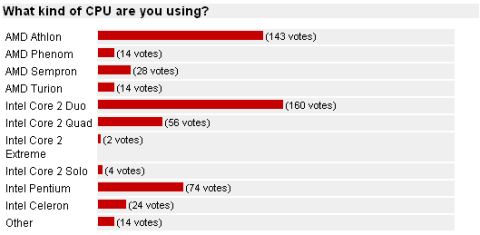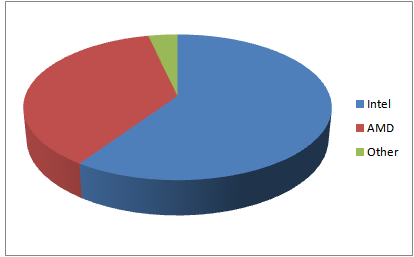More about CPUs
A couple of weeks ago I wrote something about CPUs and H.264 here, and this is just a post to follow it up. Since then, I’ve ran a poll on the type of CPU people uses, and the results are in. It’s not all that surprising, but it does give a good indication of the present AMD vs Intel war which Intel seems to be winning quite handsomely.
Let have a look at the results graph:
Breaking down the results into Intel vs AMD (vs Other), here’s what we have:
As you can see, Intel currently holds a good lead over AMD, where 60% of people polled had one of Intel’s CPUs, compared to only 37% that have AMDs. This is not really surprising, as AMD have only recently been able to properly respond to Intel’s Core 2 Duo/Quad range with the Phenom X3/X4s, largely thanks to AMD’s mistake of releasing the original Phenom with a memory addressing bug that caused huge performance problems.
What is also clear though is that while Intel has a well established brand name for it’s range of quad-core processors, AMD’s Phenom range hasn’t really taken off, and they are still reliant upon their Athlon range to fight against Intel’s Core 2 series. With the Phenom X3/X4s being priced very competitively against the Core 2 Quad, AMD’s Phenom series looks to have a bright future.
And AMD still does not have any processors that can compete with the Core 2 Extreme series … while it’s not a popular series, having the fastest CPU on the market definitely helps sell the other CPUs in the range.
Looking at the other end of the scale, at the budget processors, Intel again has many more options available than AMD, with Pentiums (both desktop and mobile), Celerons, Solos and the lower spec’d Core 2’s all competing against the Sempron and Turion.
So if AMD is to compete against Intel, then they need to focus more on the Phenom range, to pit it directly against the Core 2 Quad and some of the high end Core 2 Duos. They will also need to bring out a wider range of processors, to serve the budget through to the enthusiasts market, as it feels their current range is heavily focused around a very narrow price/performance range, with more emphasis on the lower performance/budget market, than the high end enthusiasts market. In other words, there is an Intel CPU for every type of PCs, while there doesn’t seem to be the same range from AMD.
All will change again when Intel’s Nehalem processor range is released later in the year, so there’s not much time left for AMD to act, and act they must if they want to stay competitive.


